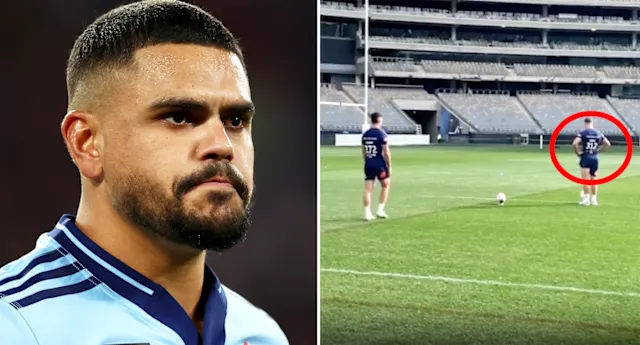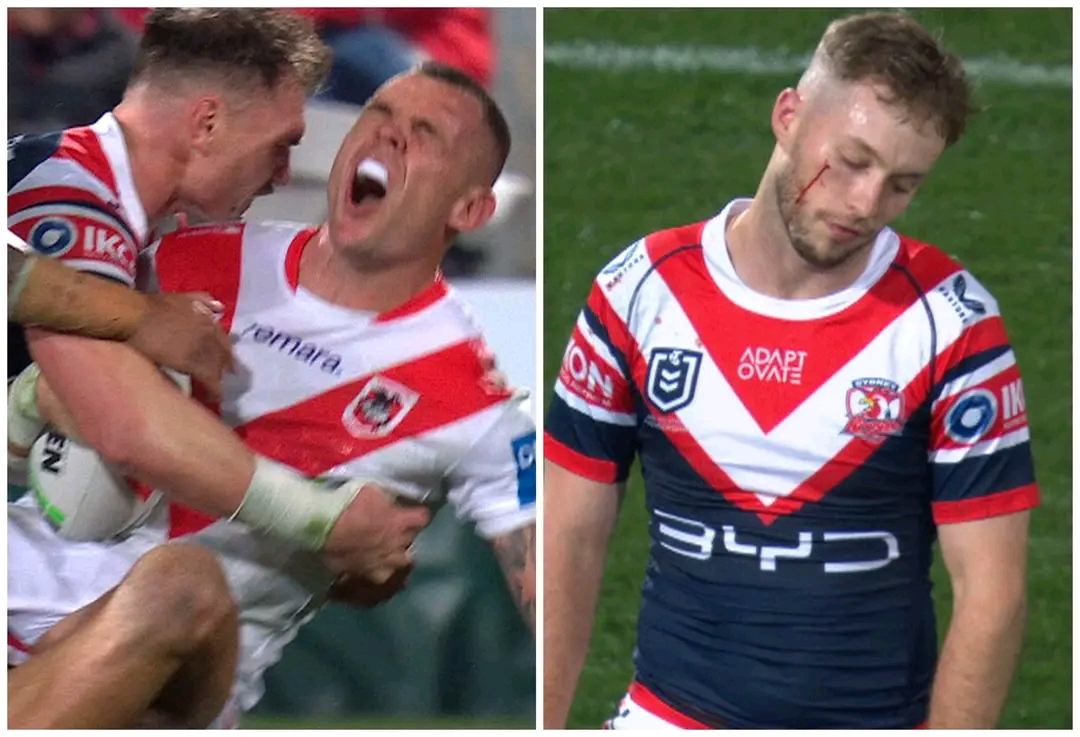Replays Reveal Blues’ Big Mistake as Goal-Kicking Stats Undermine Zac Lomax Call in Origin II
New vision and statistics have surfaced suggesting New South Wales may have seriously misjudged their choice of goal-kicker in State of Origin II, potentially costing them the match—and perhaps the series. The focus has now turned to the decision to hand the kicking tee to Zac Lomax instead of more experienced and statistically superior options like Latrell Mitchell or Stephen Crichton.
While it’s unfair to pin the Blues’ 26-24 defeat solely on Lomax, whose overall performance was solid, his struggles off the tee are difficult to ignore in such a close contest. The real issue, critics argue, is that he probably shouldn’t have been in that role in the first place.
Footage from NSW’s final training run in Perth has shed more light on how this decision came about. During Tuesday’s captain’s run, Nathan Cleary—who usually handles goal-kicking duties for the Blues—was seen grimacing and halting mid-kick, suggesting something had gone wrong. It’s since been confirmed that Cleary felt a “pop” in his groin during the session, which ruled him out of kicking duties. From that point on, he was only seen visualising his attempts rather than physically striking the ball.
Alongside Cleary was Lomax, the Parramatta winger, who then stepped in to take goal-kicking reps during training and ultimately assumed the responsibility during Wednesday night’s game at the MCG. However, this decision now appears questionable when comparing his 2025 NRL season kicking stats to those of Mitchell and Crichton.
Lomax has landed 18 goals from 23 attempts this year—a conversion rate of 78%. While decent, it falls short of his fellow Blues teammates. Cleary leads the pack with a remarkable 91% (40 from 44), followed by Mitchell at 85% (22 from 26) and Crichton close behind at 84% (36 from 43). Based purely on these figures, Lomax would have ranked fourth among available kickers.
Given these numbers, many are asking why Mitchell or Crichton didn’t take the reins when Cleary was ruled out. There’s no clear indication as to whether Blues coach Laurie Daley had input into the decision or whether it was left to the players. Regardless, the absence of a data-driven approach to this choice could have significant consequences.
One theory is that Mitchell and Crichton may have declined the responsibility. While Mitchell is known for his confident persona and leadership on the field—captaining South Sydney in key moments—he may have opted out. Similarly, Crichton, who also captains his club, was reportedly dealing with a lingering quad issue that had already jeopardised his availability for Game I. If he was still nursing that injury, he may have been reluctant to place additional stress on his leg through goal-kicking.
Yet in hindsight, one can’t help but think that the better choice was overlooked. It’s particularly glaring when considering that goal-kicking was the difference between the two sides. The Blues scored more tries (five to Queensland’s four), yet failed to convert enough of them. Lomax only managed to slot two conversions, and although none of his misses were considered easy, they proved costly.
This is not the first time Lomax has been put under the microscope for his goal-kicking. In Game I of the series, Cleary—struggling with his form—handed over the duties to Lomax, who subsequently missed a relatively easy attempt. While that miss didn’t matter in the series opener, it played a pivotal role in Game II.
Statistically speaking, even small inconsistencies in goal-kicking can tilt the outcome in tight matches. Queensland’s Reece Walsh and Valentine Holmes converted all their kicks and also benefited from a penalty goal in the first half. That minor advantage proved decisive, as NSW couldn’t bridge the gap created by Lomax’s three missed conversions.
Phil Gould, former NSW coach and seasoned rugby league analyst, didn’t mince words in his post-match comments on Channel 9. “In the end, they’ve been beaten on goal-kicking,” Gould stated. “That’s what it was. NSW scored four tries in the second half and only kicked one conversion. Queensland had a penalty goal in the first half and that’s been the difference.”
To Lomax’s credit, his form last year in Origin wasn’t a liability. He successfully kicked five out of seven in Game II of the 2024 series, and nailed all three attempts in the decider—including a couple from the sideline. That past performance may have factored into the decision to go with him again in Game II of this year. But form fluctuates, and unfortunately for NSW, this time it went the wrong way.
Looking ahead to Game III, it’s unclear whether Lomax will keep the job or if the Blues will rethink their approach. Much of that hinges on Cleary’s fitness. He has publicly stated he hopes to return for the Panthers in Round 17 against the Bulldogs, which would theoretically make him available for the series decider. But groin injuries are notoriously tricky, and if the damage is significant, he may be sidelined longer than anticipated.
If Cleary is ruled out again, NSW must make a smarter, more calculated decision regarding who takes the tee. Whether that’s Mitchell, Crichton, or even another left-field choice, it has to be someone with both the temperament and statistical backing to handle the responsibility under Origin pressure.
In the world of elite sport, small margins matter. And in this case, the numbers were there all along—NSW just didn’t follow them.
—



